AI-driven procurement is revolutionizing how organizations manage their supply chains by automating processes and enhancing decision-making capabilities. This transformation is significant as it leads to increased efficiency, cost reductions, and improved risk management. Key findings indicate that automation is increasingly seen as a key driver in business, with 80% of executives believing it enhances decision-making across various areas. Furthermore, 79% recognize procurement's crucial role in value creation within organizations. McKinsey reports that businesses adopting advanced procurement strategies can reduce costs by 10-15%, while KPMG indicates that 62% of procurement leaders prioritize digital transformation to enhance efficiency. These insights underscore the vital impact of automation on modern procurement practices.
Let's see the glimpse below,
- Introduction
- Challenges in Modern Procurement
- Rise of Automation in the Procurement Sector
- Key Applications of AI in Procurement
- How AI Enhances Decision-Making in Procurement
- Risk Management Through AI and Automation
- Quantitative Benefits of AI-Driven Procurement
- Best Practices for Adopting AI in Procurement
- Optimizing Procurement Processes with Yoroflow
- Final Thoughts: Embracing AI-Driven Procurement with Yoroflow for Future Success
Introduction
AI-Driven Procurement
AI-driven procurement refers to the integration of artificial intelligence technologies into the procurement process to enhance overall efficiency, accuracy, and strategic decision-making. This innovative approach leverages advanced technologies such as machine learning, predictive analytics, and natural language processing to automate routine tasks, analyze vast amounts of data, and provide actionable insights. By utilizing AI, procurement teams can streamline workflows and make more informed decisions, ultimately leading to improved procurement outcomes. For instance, AI can optimize supplier selection, forecast demand more accurately, and reduce costs associated with manual processes.
Scope of AI-Driven Procurement
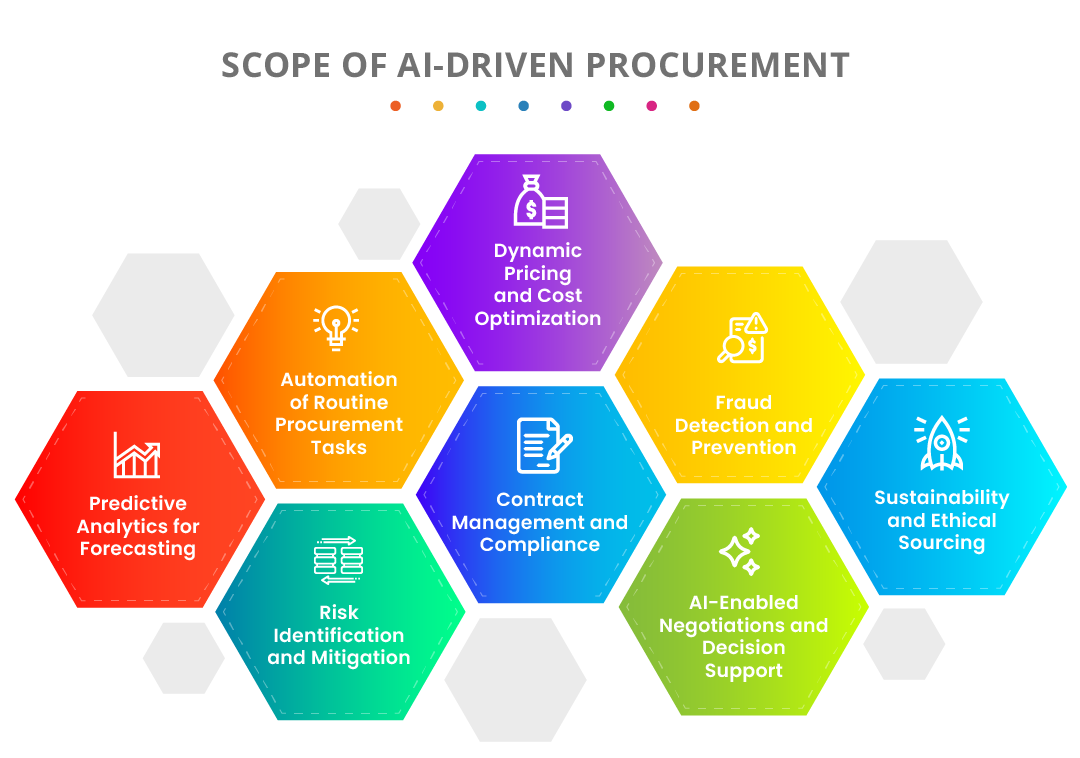
1. Predictive Analytics for Forecasting:
AI’s ability to analyze historical data enables procurement teams to predict future demand, pricing trends, and market conditions. This predictive capability helps organizations prepare for potential fluctuations in supply or price, ensuring more strategic purchasing decisions and inventory management.
2. Automation of Routine Procurement Tasks:
AI automates routine and time-consuming tasks such as generating purchase orders, processing invoices, and managing contracts. AI algorithms can process vast amounts of data quickly, streamlining operations, and freeing up procurement professionals to focus on more strategic activities.
3. Risk Identification and Mitigation:
AI-driven systems continuously monitor market conditions, supplier performance, geopolitical factors, and other external events that could impact supply chains. By identifying risks early—whether it's supplier financial instability, legal issues, or potential fraud—AI enables organizations to proactively mitigate these risks before they escalate.
4. Dynamic Pricing and Cost Optimization:
AI algorithms can analyze market trends and suggest the best time to purchase goods or services, helping organizations lock in the most favorable prices. AI can also optimize procurement budgets by assessing the total cost of ownership (TCO) rather than just focusing on the lowest initial purchase price, leading to long-term savings.
5. Contract Management and Compliance:
AI-powered tools help organizations manage procurement contracts by flagging deviations from standard terms, identifying potential risks in contract language, and ensuring compliance with internal policies and external regulations. AI can also assist in contract negotiations by highlighting key variables that impact pricing and terms.
6. Fraud Detection and Prevention:
AI systems can detect irregularities or anomalies in procurement transactions that may signal fraud. For example, AI can identify unusual patterns in supplier invoicing or payment processes, ensuring that procurement practices remain compliant and reducing the risk of financial loss.
7. AI-Enabled Negotiations and Decision Support:
AI tools can simulate different negotiation scenarios, suggesting optimal strategies for achieving favorable terms. AI’s ability to process vast amounts of data provides procurement teams with actionable insights that guide decision-making in supplier negotiations, enhancing overall procurement outcomes.
8. Sustainability and Ethical Sourcing:
AI can analyze suppliers’ sustainability practices, helping organizations meet environmental, social, and governance (ESG) criteria. By evaluating suppliers’ carbon footprints, labor practices, and ethical sourcing, AI assists procurement teams in making decisions that align with corporate responsibility goals.
Broader Impact on the Procurement Ecosystem:
AI-driven procurement is not limited to transactional efficiencies. It’s a transformative approach that fundamentally reshapes how procurement operates across the entire supply chain. By automating processes, generating real-time insights, and mitigating risks, AI improves overall procurement performance, ensuring that companies stay agile in today’s fast-paced, data-rich business environment.
The scope of AI-driven procurement also extends to future innovations, such as integrating AI with Internet of Things (IoT) technologies for real-time supply chain monitoring or leveraging blockchain for more transparent and secure procurement processes. As AI technology continues to advance, procurement functions will become more strategic, contributing to a company’s competitive edge and long-term success.
Challenges in Modern Procurement
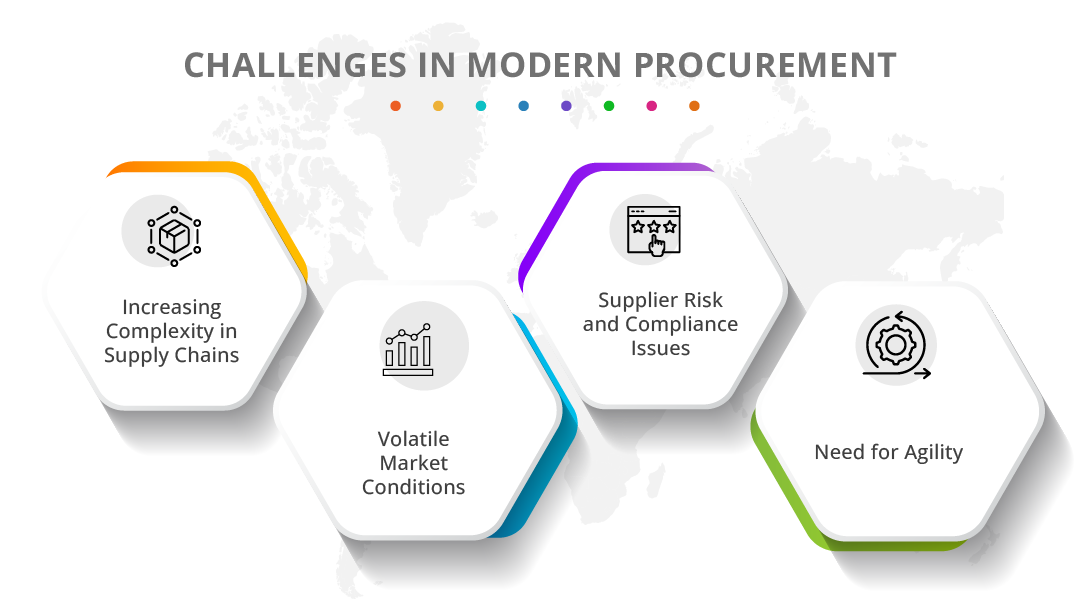
While digital transformation brought efficiency improvements, modern procurement still faces several challenges that necessitate the need for advanced automation and AI technologies:
- Increasing Complexity in Supply Chains: Globalization has expanded supply chains, making them more complex and harder to manage. Organizations now deal with multiple suppliers across different regions, making it difficult to track performance, ensure compliance, and manage risk effectively.
- Volatile Market Conditions: Frequent fluctuations in raw material prices, currency exchange rates, and changing trade policies have introduced volatility into procurement. Traditional methods struggle to cope with these dynamic market conditions, often resulting in delays or increased costs.
- Supplier Risk and Compliance Issues: Supplier risks, such as financial instability, labor violations, or environmental non-compliance, have grown in importance. Manual risk assessment processes are often insufficient to detect these issues early, leaving companies exposed to potential disruptions or reputational damage.
- Need for Agility: In today's fast-paced business environment, organizations require greater agility in procurement. Delays in sourcing or reacting to market shifts can lead to lost opportunities or supply chain disruptions.
Rise of Automation in the Procurement Sector
The adoption of automation within the procurement sector has surged significantly as organizations strive to enhance their operational efficiency. Several factors contribute to this trend, including the pressing need for cost savings, improved efficiency, and enhanced supplier management. With the increasing complexity of global supply chains and the pressures of maintaining competitiveness, businesses recognize that traditional procurement practices are insufficient. AI-driven solutions, like those offered by Yoroflow, provide a powerful alternative, enabling procurement teams to automate repetitive tasks such as purchase order processing, invoice matching, and supplier assessments.
Yoroflow's innovative platform streamlines procurement workflows, allowing organizations to harness the power of automation effectively. Moreover, automation empowers procurement professionals to focus on strategic activities, fostering better supplier relationships and enhancing collaboration. By automating data collection and analysis, teams gain real-time visibility into procurement processes, facilitating faster and more accurate decision-making. This shift towards automation is not just a response to current market demands but also a proactive strategy for future resilience. As businesses embrace these technologies, AI-driven procurement, exemplified by Yoroflow, is becoming a fundamental aspect of modern procurement strategies, allowing organizations to respond quickly to changing market conditions and complex supply chain challenges. Thus, the rise of automation is not merely a trend but a necessary evolution in the procurement landscape.
Key Applications of AI in Procurement
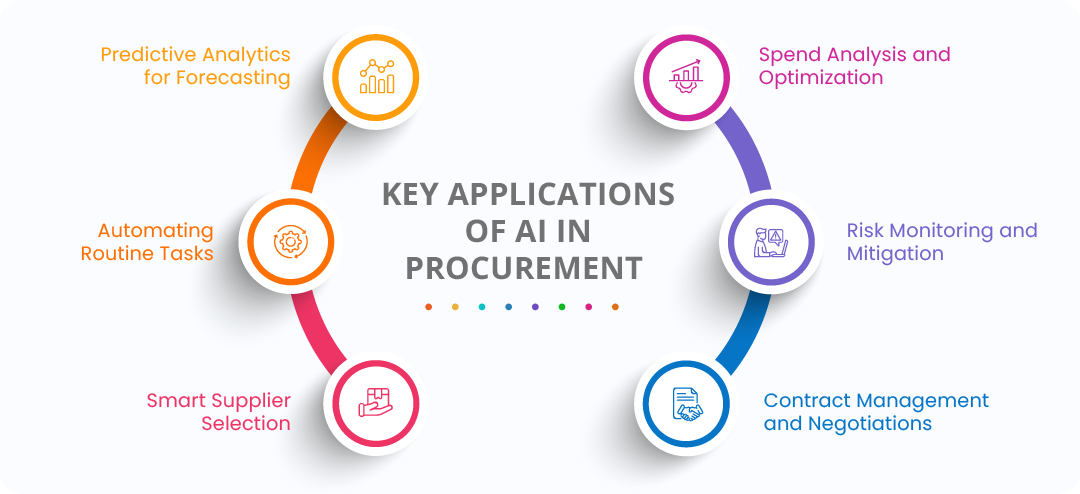
1. Predictive Analytics for Forecasting
AI-powered predictive analytics helps procurement teams forecast demand, identify supply chain risks, and analyze market trends. By providing insights into potential future events, these tools allow teams to make proactive, data-driven decisions that can prevent disruptions, improve planning accuracy, and maintain operational efficiency, leading to more resilient procurement processes.
2. Automating Routine Tasks
AI automates routine tasks such as purchase order creation, invoice processing, and supplier onboarding, drastically reducing manual workload and procurement errors. By streamlining these processes, organizations can accelerate procurement cycles by up to 40%, freeing up procurement teams to focus on strategic activities and enhancing overall operational efficiency.
3. Smart Supplier Selection
AI evaluates and ranks suppliers by analyzing key performance indicators such as delivery reliability, compliance with regulations, and cost efficiency. This data-driven approach helps procurement teams make objective, informed decisions, ensuring that only high-performing, compliant vendors are selected. By reducing the risk of working with underperforming suppliers, AI optimizes supplier management, leading to stronger relationships and improved supply chain stability. This systematic evaluation also streamlines the supplier selection process, saving time and resources while enhancing procurement outcomes.
4. Spend Analysis and Optimization
AI processes vast procurement data to uncover cost-saving opportunities by analyzing spending patterns. This allows procurement teams to refine their sourcing strategies, ensuring that purchases are cost-effective and aligned with business objectives. AI-driven insights enable better vendor negotiations, more accurate budget control, and optimized procurement decisions, enhancing overall efficiency.
5. Risk Monitoring and Mitigation
AI continuously monitors suppliers, market conditions, and regulatory compliance to deliver real-time risk assessments. By analyzing vast data sets, it identifies early warning signs of potential disruptions, such as supplier failures or market volatility. This proactive approach allows organizations to take preventive measures, minimizing supply chain risks and ensuring smoother operations.
6. Contract Management and Negotiations
AI-driven procurement tools analyze historical data and real-time market conditions to offer actionable insights that enhance contract negotiations. This data-driven approach enables procurement professionals to identify key leverage points, improving their ability to secure more favorable terms with suppliers. By optimizing cost structures, improving performance benchmarks, and minimizing risks, these tools help ensure better overall procurement outcomes.
How AI Enhances Decision-Making in Procurement
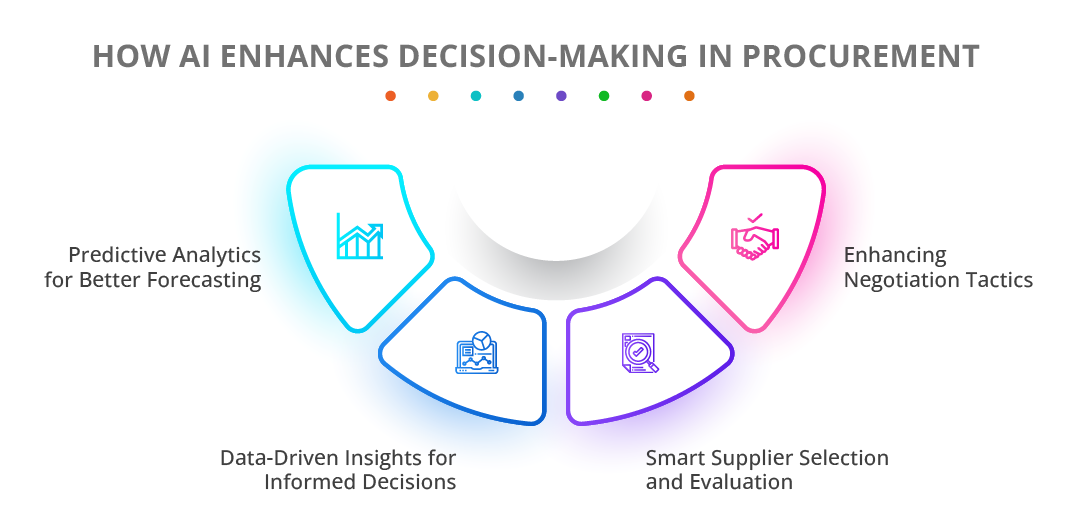
Predictive Analytics for Better Forecasting
AI enables organizations to predict demand, supply chain risks, and market trends, significantly improving procurement planning and supplier selection. By analyzing historical data, predictive analytics helps businesses forecast future needs more accurately, allowing them to mitigate risks and make timely purchasing decisions.
Data-Driven Insights for Informed Decisions
AI tools analyze spent data and market intelligence to enhance decision-making. By leveraging real-time data, procurement teams can optimize sourcing strategies and identify cost-saving opportunities, leading to more informed and strategic choices.
Smart Supplier Selection and Evaluation
AI aids in identifying and ranking suppliers based on performance, compliance, and cost. By automating the supplier vetting and qualification processes, organizations can streamline their supplier management and ensure they partner with the best candidates.
Enhancing Negotiation Tactics
AI-driven procurement tools provide valuable insights that improve contract negotiations with suppliers. By analyzing previous contracts and market conditions, these tools equip procurement professionals with the information needed to negotiate more favorable terms and conditions.
Risk Management Through AI and Automation
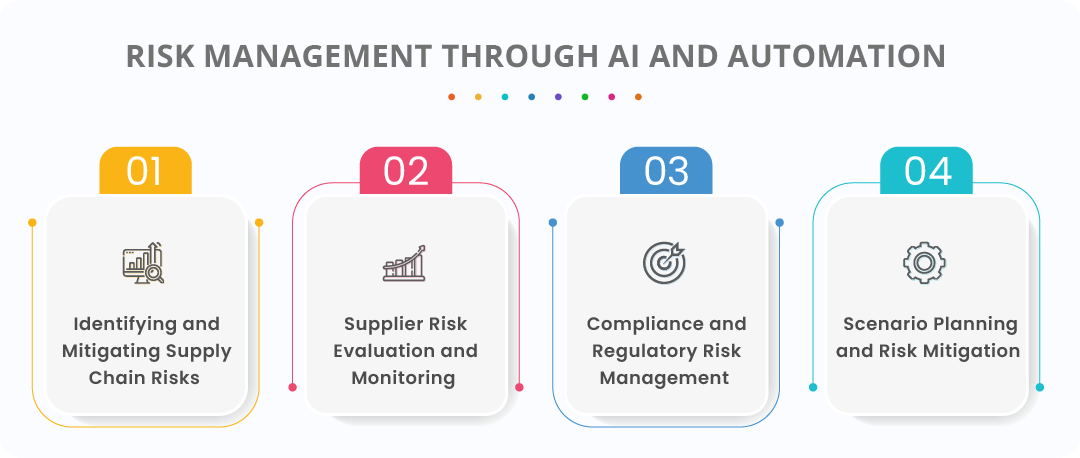
Identifying and Mitigating Supply Chain Risks
AI plays a crucial role in identifying potential risks, such as supplier failures and geopolitical challenges, before they disrupt operations. By conducting automated risk assessments and real-time monitoring, organizations can maintain oversight of supplier health and market conditions, allowing for proactive measures to mitigate risks.
Supplier Risk Evaluation and Monitoring
Continuous monitoring of supplier performance is facilitated through AI-based dashboards and alerts. These tools provide early warnings of potential supply chain disruptions or compliance issues, enabling swift action to address any challenges.
Compliance and Regulatory Risk Management
AI-driven platforms automate compliance checks related to ethical sourcing and sustainability, ensuring that procurement processes adhere to both local and global regulations. This capability helps organizations maintain transparency and accountability throughout their supply chains.
Scenario Planning and Risk Mitigation
AI-enabled scenario analysis allows businesses to test various risk factors and develop effective mitigation strategies. Automation streamlines the creation of contingency plans, ensuring that organizations are well-prepared to respond to unforeseen disruptions while minimizing potential impacts on operations.
Quantitative Benefits of AI-Driven Procurement
The integration of AI in procurement processes offers substantial quantitative benefits that can significantly impact an organization’s bottom line. Key advantages include cost savings, improved efficiency, and risk reduction, all of which contribute to a more streamlined and effective procurement function.
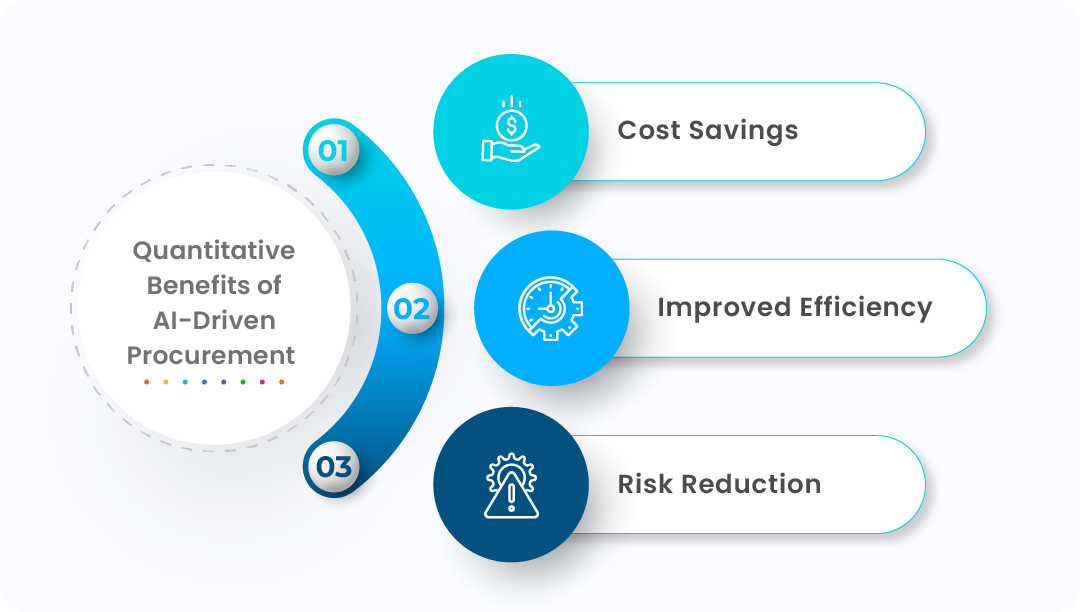
Cost Savings
AI-driven procurement solutions can lead to significant cost reductions across various dimensions. By automating routine tasks such as purchase order creation, invoice processing, and contract management, organizations can reduce labor costs associated with manual processing. Additionally, AI analytics enable more strategic sourcing decisions, allowing procurement teams to negotiate better terms and identify alternative suppliers, ultimately leading to lower prices and better contract conditions. For example, organizations using AI can achieve cost savings of 10-20% on average in their procurement expenses by optimizing supplier selection and consolidating purchases.
Improved Efficiency
AI technologies dramatically enhance operational efficiency within procurement. Automation speeds up processes, reduces the time taken to approve purchase orders and invoices, and minimizes delays in procurement cycles. With machine learning algorithms analyzing historical data, organizations can predict demand accurately, ensuring timely inventory replenishment and reducing the risk of stockouts. This improved responsiveness can lead to a 30-50% reduction in procurement cycle time, enabling teams to focus on strategic initiatives rather than administrative tasks. Enhanced efficiency translates directly into higher productivity, allowing procurement professionals to manage more transactions and relationships effectively.
Risk Reduction
Incorporating AI into procurement processes also enhances risk management capabilities. AI systems can continuously monitor supplier performance, flagging potential issues such as compliance violations, financial instability, or delivery delays before they escalate. This proactive approach enables organizations to mitigate risks, fostering stronger supplier relationships and ensuring continuity of supply. Moreover, AI-driven solutions provide comprehensive audit trails and compliance checks, helping organizations adhere to regulations and internal policies. This increased oversight can lead to a 20-30% decrease in procurement-related risks, ensuring that organizations remain compliant and protected against potential disruptions.
Best Practices for Adopting AI in Procurement
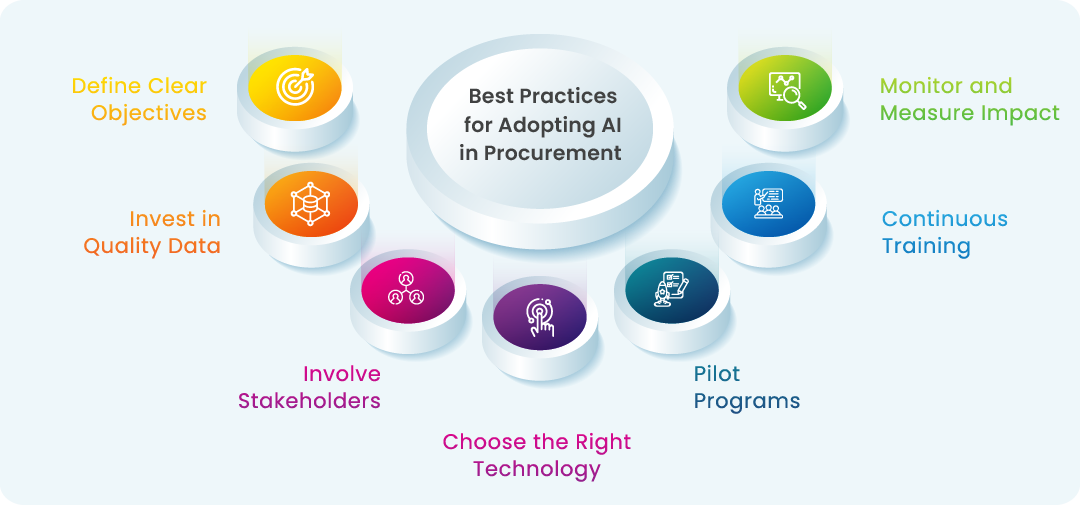
Successfully integrating AI into procurement processes requires a strategic approach.
- Define Clear Objectives: Organizations should begin by establishing specific goals for AI integration, such as reducing operational costs, enhancing supplier performance, or streamlining processes. This clarity will guide the entire implementation process.
- Invest in Quality Data: High-quality data is crucial for AI effectiveness. Ensuring that procurement data is accurate, comprehensive, and well-structured allows AI tools to analyze information reliably, leading to better insights and decisions.
- Involve Stakeholders: Engaging procurement teams and key stakeholders' early fosters acceptance and collaboration. Their insights can shape the AI strategy, making it more relevant to the organization’s needs.
- Choose the Right Technology: Selecting AI solutions that align with organizational needs and existing systems is vital. Compatibility ensures seamless integration and maximizes the potential of the AI tools.
- Pilot Programs: Implementing pilot projects allows organizations to test AI tools in controlled environments. This approach provides valuable feedback, enabling necessary adjustments before full-scale deployment.
- Continuous Training: Ongoing training for staff enhances understanding and utilization of AI technologies. It ensures that teams are well-equipped to leverage AI tools effectively.
- Monitor and Measure Impact: Establishing key performance indicators (KPIs) helps evaluate the effectiveness of AI implementations. Regular monitoring and data-driven adjustments can optimize outcomes and drive continuous improvement.
Optimizing Procurement Processes with Yoroflow
Yoroflow enhances procurement processes through its robust automation and workflow management features, making it easier for organizations to manage their supply chains efficiently. One of the key advantages of Yoroflow is its ability to automate repetitive tasks such as purchase order creation, invoice processing, and contract management. By eliminating manual effort, Yoroflow reduces the risk of errors and accelerates procurement cycles. Automated purchase order generation ensures that orders are placed promptly based on inventory levels, while streamlined invoice processing accelerates payment cycles, fostering positive supplier relationships.
The platform's customizable approval workflows further enhance efficiency by routing purchase orders and invoices to the appropriate stakeholders for quick approval. This results in faster decision-making and greater accountability within the procurement team. With real-time insights into the status of orders and invoices, teams can make informed decisions without unnecessary delays.
Yoroflow also facilitates better supplier management. The platform automates the supplier onboarding process, capturing necessary documentation and performing compliance checks to ensure that suppliers meet organizational standards. Additionally, Yoroflow provides dashboards to monitor supplier performance, enabling procurement teams to assess reliability and quality over time. This data-driven approach allows for strategic sourcing and informed negotiations.
Risk management is another critical area where Yoroflow excels. The platform continuously assesses supplier risks, such as financial stability and compliance issues, alerting teams to potential problems before they escalate. With comprehensive audit trials and automated compliance checks, Yoroflow ensures that procurement activities adhere to internal policies and external regulations.
Finally, Yoroflow’s collaborative features foster seamless communication across departments, aligning procurement with finance, operations, and legal teams. This integrated approach enhances overall efficiency and supports strategic decision-making, enabling organizations to optimize their procurement functions effectively. In summary, Yoroflow empowers procurement teams to operate more strategically, save time, reduce costs, and drive better outcomes for the business.
Final Thoughts: Embracing AI-Driven Procurement with Yoroflow for Future Success
As we explore the transformative impact of artificial intelligence (AI) on procurement, it is clear that technologies like Yoroflow are reshaping decision-making and risk management in profound ways. By leveraging AI, procurement teams gain access to real-time data analysis, predictive insights, and automation capabilities that significantly enhance their efficiency and effectiveness. With Yoroflow, organizations can automate routine tasks, optimize supplier relationships, and make data-driven decisions that lead to substantial cost savings. Moreover, the platform's AI-driven analytics help identify potential risks by continuously monitoring supplier performance and compliance, fostering a proactive approach to risk management.
For organizations eager to implement AI-driven procurement, the path forward involves a strategic approach to integration. This starts with identifying specific challenges within existing procurement processes that AI solutions like Yoroflow can address. By assessing the various features of Yoroflow—such as its automation tools, analytics capabilities, and supplier management functions—organizations can tailor their procurement strategies to meet their unique needs. Furthermore, investing in training for procurement teams is essential to ensure they can maximize the benefits of these technologies effectively.
By embracing these advanced technologies, businesses can streamline their processes, enhance decision-making, and build a resilient supply chain. Those who leverage Yoroflow's capabilities will not only improve operational efficiency but also position themselves for sustained success in an increasingly dynamic procurement landscape. Adopting AI-driven procurement with Yoroflow is not just an option; it’s a strategic imperative for organizations aiming to thrive in the future.